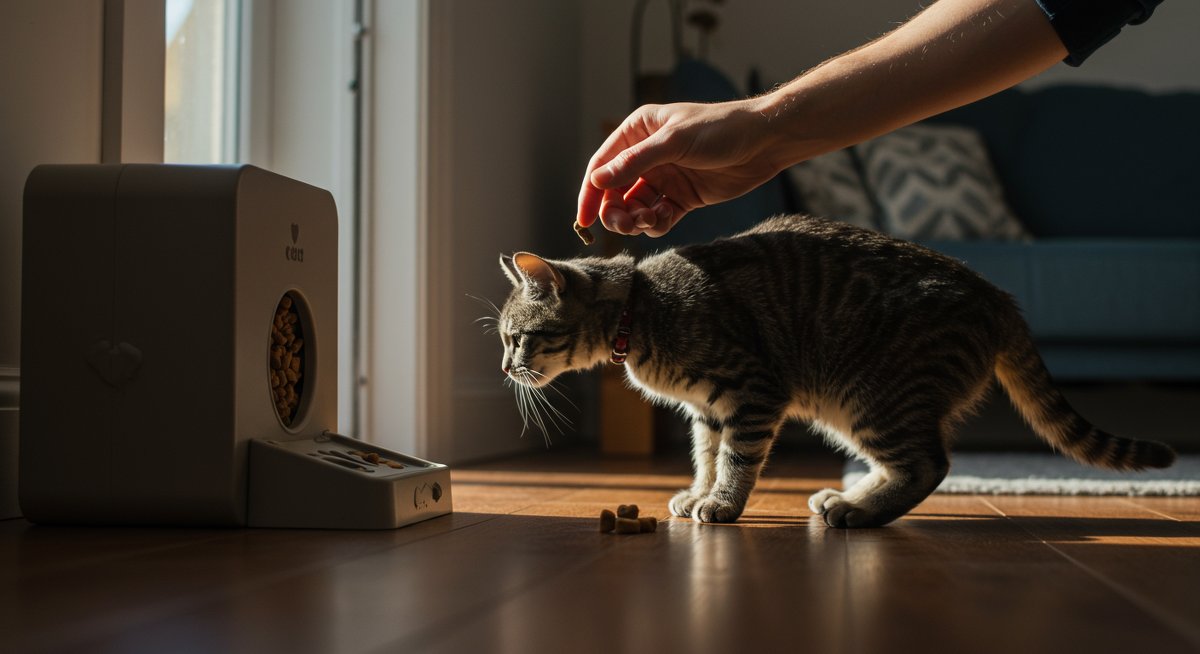As experienced pet parents, you understand the joys and responsibilities that come with providing the best possible care for your animal companions. One of the most critical aspects of pet care is maintaining a healthy weight. Pet obesity is a growing concern, and recognizing the signs, understanding the causes, and implementing effective strategies are essential for ensuring your pet's long-term health and well-being. This guide dives deep into advanced strategies for pet weight management, offering insights into optimizing your pet's health through diet, exercise, and proactive care. We'll explore common challenges, provide actionable solutions, and equip you with the knowledge to make informed decisions for your beloved pet.

Deep Dive into Pet Weight Management for Advanced Pet Parents
Pet obesity isn't just about aesthetics; it's a significant health risk. Overweight pets are prone to a variety of health issues, including diabetes, arthritis, heart disease, and a reduced lifespan. As experienced pet parents, you've likely encountered these challenges or are proactively seeking ways to prevent them. This section focuses on providing a comprehensive understanding of pet obesity, including its causes, consequences, and advanced strategies for effective management.
Understanding the Causes
Several factors contribute to pet obesity. Overfeeding, lack of exercise, breed predisposition, age, and underlying medical conditions play crucial roles. It's important to recognize that what works for one pet may not work for another. Tailoring your approach based on your pet's specific needs is key.
Example 1: Consider a Labrador Retriever, a breed known for its love of food and tendency to gain weight. Even with regular exercise, a Labrador can easily become overweight if fed excessive portions or given too many treats. A proactive approach involves carefully measuring food portions, opting for low-calorie treats, and providing ample opportunities for physical activity.
Example 2: An older cat with reduced mobility may not burn as many calories as a younger, more active cat. Adjusting the diet to a senior-specific formula and incorporating interactive playtime, such as using wand toys, can help manage weight effectively.
Example 3: Some pets have underlying medical conditions, such as hypothyroidism, that can contribute to weight gain. In these cases, addressing the medical issue under veterinary guidance is crucial for successful weight management.
Consequences of Pet Obesity
The impact of obesity on a pet's health can be devastating. It increases the risk of developing diabetes, which requires lifelong management and can significantly impact quality of life. Joint problems, such as arthritis, are also common, leading to pain and reduced mobility. Heart disease, respiratory issues, and certain types of cancer are more prevalent in overweight pets. Additionally, obesity can shorten a pet's lifespan, diminishing the time you have together.
Example 1: A Dachshund with excess weight is at a higher risk of intervertebral disc disease (IVDD), a painful condition that can lead to paralysis.
Example 2: An overweight cat may struggle with grooming, leading to skin issues and matting.
Example 3: Obese pets undergoing surgery face increased risks due to anesthesia complications and slower healing times.
Expert Tip: Regularly monitor your pet's body condition score (BCS). This simple assessment involves feeling for ribs and observing body shape. A BCS chart can help you determine if your pet is at a healthy weight. Consult your veterinarian for guidance on assessing your pet's BCS.
Advanced Strategies
Implementing advanced strategies requires a multi-faceted approach, including diet, exercise, and professional guidance.
Diet: Focus on a high-quality, portion-controlled diet. Consider a diet formulated for weight management, with lower calorie density and higher fiber content to promote satiety.
Exercise: Tailor exercise to your pet's breed, age, and physical condition. Incorporate daily walks, play sessions, and interactive toys.
Professional Guidance: Work with your veterinarian to develop a personalized weight-loss plan. They can provide recommendations on diet, exercise, and address any underlying medical conditions.
Case Study: Achieving a Healthy Weight with Your Pet
Success in pet weight management requires commitment and a well-defined plan. This section provides a case study, illustrating a successful weight-loss journey and highlighting key strategies and outcomes.
Meet Max: A Dachshund's Transformation
Max, a 10-year-old Dachshund, weighed 35 pounds, significantly over his ideal weight of 20-24 pounds. He loved treats, and his owners, while loving, often indulged him. His veterinarian diagnosed him with early signs of arthritis and recommended a weight-loss program. The plan included a switch to a weight-management food, portion control, increased exercise, and regular check-ins.
Implementing the Plan
Diet: Max's owners switched to Hill's Science Diet Perfect Weight, a veterinarian-recommended food designed for weight management. They carefully measured his portions based on the vet's recommendations. Initially, they used a kitchen scale to ensure accuracy.
Exercise: Daily walks were increased from 20 minutes to 40 minutes. Max's owners also incorporated short play sessions with a ball in the backyard.
Monitoring and Adjustments: Max's owners tracked his progress weekly, weighing him and noting any changes in his body condition. After the first month, Max had lost 2 pounds. The veterinarian adjusted his food portions based on his progress.
Challenges and Solutions: One challenge was Max's love for treats. The owners replaced high-calorie treats with low-calorie alternatives, such as small pieces of carrots or green beans. They also used his kibble as rewards during training sessions.
The Outcome
Over six months, Max lost 10 pounds, reaching his ideal weight. His arthritis symptoms improved significantly. His energy levels increased, and he became more active and playful. The vet was extremely pleased with Max's progress. His owners learned that patience and consistency were key to success. Max’s story shows that with the right approach, overweight pets can achieve a healthier life.
Expert Tip: Keep a detailed food journal and exercise log. This will help you monitor your pet's progress and identify any obstacles. This data can be invaluable when consulting with your veterinarian.

Integrating Advanced Care Practices
Maintaining a healthy weight is an ongoing process. This section delves into advanced care practices, helping you sustain your pet's healthy weight and overall well-being.
Long-Term Dietary Strategies
Once your pet reaches their ideal weight, it’s essential to maintain a healthy diet. Continue with portion control and consider a maintenance food. Avoid free-feeding, which can lead to overeating. Monitor the calorie content of any treats or supplements. Be mindful of any changes in your pet's activity level and adjust food portions accordingly.
Example 1: If your pet becomes less active during the winter months, slightly reduce their food intake to compensate.
Example 2: Regularly review pet food labels, and consult your veterinarian about transitioning to different food formulations as your pet ages or if their activity levels change.
Exercise and Enrichment
Consistent exercise is crucial for long-term weight management and overall health. Vary your pet’s exercise routine to keep them engaged. Mix up walks with playtime, interactive games, and mental stimulation activities. Consider using puzzle toys to encourage your pet to work for their food or treats. Regular physical activity helps maintain muscle mass, improves cardiovascular health, and boosts your pet's mood.
Example 1: For a dog, consider agility training or scent work to provide both physical and mental stimulation.
Example 2: For cats, provide vertical space with cat trees and shelves to encourage climbing and activity. Engage in interactive playtime with wand toys or laser pointers.
Routine Monitoring
Regular check-ups with your veterinarian are essential for monitoring your pet's weight and overall health. Discuss any concerns you have about your pet's weight or eating habits. Be prepared to provide information about your pet's diet, exercise routine, and any changes in behavior. The vet can also perform a body condition score assessment and make recommendations for adjusting your pet's plan. Monitor your pet's weight at home and track their progress over time.
Example 1: Schedule twice-yearly veterinary visits to track weight and assess overall health.
Example 2: Use a pet scale at home to track weight changes and identify any trends early.
Expert Tip: Educate yourself on the signs of common health issues that may be related to obesity, such as diabetes or joint pain. Early detection allows for timely intervention and improved outcomes.
Expert-Level Pet Care Insights
Successfully managing your pet's weight requires dedication, knowledge, and a willingness to adapt. This guide has provided advanced strategies for promoting a healthy weight in your pet. Remember that every pet is unique, and a personalized approach is key to achieving optimal results. By implementing these strategies and working with your veterinarian, you can help your pet live a longer, healthier, and happier life. Be patient, consistent, and celebrate your pet’s successes along the way. The investment in their health is an investment in your bond, and your pet will be grateful for your efforts.
In addition to the information provided, consider these expert-level insights:
- Consider a Veterinary Nutritionist: For complex cases or pets with underlying health conditions, consulting a veterinary nutritionist can be extremely beneficial. They can provide tailored dietary plans and guidance.
- Explore Prescription Diets: For pets with specific medical needs, your vet may recommend a prescription diet designed to manage their condition and promote weight loss.
- Educate Yourself Continuously: Stay informed about the latest research and advancements in pet nutrition and weight management. Websites, books, and veterinary resources can help you stay current.
By embracing these expert-level insights, you will further elevate your pet's care and create a truly enriching experience for your beloved companion. Remember that you, as an experienced pet parent, are the driving force in maintaining your pet's health, making the commitment to create lasting positive changes.